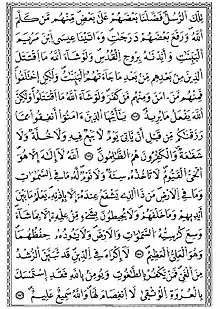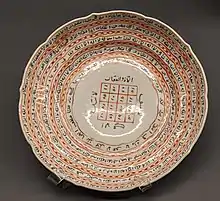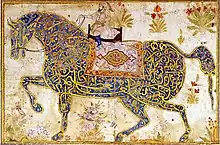Q2:255 Ayatul Kursi
The Throne Verse (Arabic: آيَة الْكُرْسِي, ʾāyat al-kursī) is the 255th verse of the 2nd surah of the Quran, Al-Baqarah (Q2:255). The verse speaks about how nothing and nobody is regarded to be comparable to Allah.[1][2]

This is one of the best-known verses of the Quran and is widely memorised and displayed in the Muslim world.[3] It is often recited to ward off evil spirits.[4]
Text and meaning

Verse Al-Kursi consists of ten permanent sentences.[5]
Text and transliteration
Hafs from Aasim ibn Abi al-Najud
اَللَّهُ لَا إِلَهَ إِلَّا هُوَ
ج
255 Allāhu lā ilāha illā hū
ٱلْحَىُّ ٱلْقَيُّومُ ج
Al ḥayyu l-qayyūm
لَا تَأْخُذُهُۥ سِنَةٌ وَلَا نَوْمٌ ج
Lā ta’khudhuhū sinatun walā nawm
لَّهُۥ مَا فِى ٱلسَّمَٰوَٰتِ وَمَا فِى ٱلْأَرْضِ قلے
Lahū mā fi s-samāwāti wamā fi l-’arḍ
مَن ذَا ٱلَّذِى يَشْفَعُ عِندَهُۥٓ إِلَّا بِإِذْنِهِۦ ج
Man dha l-ladhī yashfa‘u ‘indahū ’illā bi’idhnih
يَعْلَمُ مَا بَيْنَ أَيْدِيهِمْ وَمَا خَلْفَهُمْ صلے
Ya‘lamu mā bayna ’aydīhim wamā khalfahum
وَلَا يُحِيطُونَ بِشَىْءٍ مِّنْ عِلْمِهِۦٓ إِلَّا بِمَا شَآءَ ج
walā yuḥītūna bishay’in min ‘ilmihī ’illā bimā shā’
وَسِعَ كُرْسِيُّهُ ٱلسَّمَٰوَٰتِ وَٱلْأَرْضَ صلے
Wasi‘a kursiyuhu s-samāwāti wal’arḍ
وَلَا يَـُٔودُهُۥ حِفْظُهُمَا ج
Walā ya’ūduhū ḥifẓuhumā
وَهُوَ ٱلْعَلِىُّ ٱلْعَظِيمُ [6]
Wahuwa l-‘aliyyu l-‘aẓīm
Meaning
"Allah! There is no god but He,-the Living, the Self-subsisting, Eternal. No slumber can seize Him nor sleep. His are all things in the heavens and on earth. Who is there can intercede in His presence except as He permitteth? He knoweth what (appeareth to His creatures as) before or after or behind them. Nor shall they compass aught of His knowledge except as He willeth. His Throne doth extend over the heavens and the earth, and He feeleth no fatigue in guarding and preserving them for He is the Most High, the Supreme (in glory)."[Quran 2:255 (Translated by Yusuf Ali)]
Ayatul Kursi Benefits and Hadith

Ayat al-Kursi is regarded as the greatest verse of Quran according to hadith.[7]
Ubayy bin Kab said: The Messenger of Allah (peace be upon him) said: Abu al-Mundhir, which verse of Allah's Book that you have is greatest? I replied: Allah and His Messenger know best. He said: Abu al-Mundhir, which verse of Allah's that you have is greatest? I said: Allah, there is no god but He, the Living, the Eternal. Thereupon he struck me on the beast and said: May knowledge be pleasant for you, Abu al-Mundhir.
— Abu Dawood 1460[8]
The verse is regarded as one of the most powerful ayahs in the Quran because when it is recited, the greatness of God is believed to be confirmed. The person who recites this ayah morning and evening will be under protection of God from the evil of the jinn and the shayatin (demons); this is also known as the daily adkhar. It is used in exorcism, to cure and protect from jinn and shayatin.[9] Because the Throne Verse is believed to grant spiritual or physical protection, it is often recited by Muslims before setting out on a journey and before going to sleep.[3]
Narrated Abu Huraira: Allah's Messenger (ﷺ) deputed me to keep Sadaqat (al-Fitr) of Ramadan. A comer came and started taking handfuls of the foodstuff (of the Sadaqa) (stealthily). I took hold of him and said, "By Allah, I will take you to Allah's Messenger (ﷺ) ." He said, "I am needy and have many dependents, and I am in great need." I released him, and in the morning Allah's Messenger (ﷺ) asked me, "What did your prisoner do yesterday?" I said, "O Allah's Messenger (ﷺ)! The person complained of being needy and of having many dependents, so, I pitied him and let him go." Allah's Messenger (ﷺ) said, "Indeed, he told you a lie and he will be coming again." I believed that he would show up again as Allah's Messenger (ﷺ) had told me that he would return. So, I waited for him watchfully. When he (showed up and) started stealing handfuls of foodstuff, I caught hold of him again and said, "I will definitely take you to Allah's Messenger (ﷺ). He said, "Leave me, for I am very needy and have many dependents. I promise I will not come back again." I pitied him and let him go. In the morning Allah's Messenger (ﷺ) asked me, "What did your prisoner do." I replied, "O Allah's Messenger (ﷺ)! He complained of his great need and of too many dependents, so I took pity on him and set him free." Allah's Apostle said, "Verily, he told you a lie and he will return." I waited for him attentively for the third time, and when he (came and) started stealing handfuls of the foodstuff, I caught hold of him and said, "I will surely take you to Allah's Messenger (ﷺ) as it is the third time you promise not to return, yet you break your promise and come." He said, "(Forgive me and) I will teach you some words with which Allah will benefit you." I asked, "What are they?" He replied, "Whenever you go to bed, recite "Ayat-al-Kursi"-- 'Allahu la ilaha illa huwa-l-Haiy-ul Qaiyum' till you finish the whole verse. (If you do so), Allah will appoint a guard for you who will stay with you and no satan will come near you till morning. " So, I released him. In the morning, Allah's Apostle asked, "What did your prisoner do yesterday?" I replied, "He claimed that he would teach me some words by which Allah will benefit me, so I let him go." Allah's Messenger (ﷺ) asked, "What are they?" I replied, "He said to me, 'Whenever you go to bed, recite Ayat-al-Kursi from the beginning to the end ---- Allahu la ilaha illa huwa-lHaiy-ul-Qaiyum----.' He further said to me, '(If you do so), Allah will appoint a guard for you who will stay with you, and no satan will come near you till morning.' (Abu Huraira or another sub-narrator) added that they (the companions) were very keen to do good deeds. The Prophet (ﷺ) said, "He really spoke the truth, although he is an absolute liar. Do you know whom you were talking to, these three nights, O Abu Huraira?" Abu Huraira said, "No." He said, "It was Satan."
— Sahih al-Bukhari 2311[7]
The verse is also used for safety and survival from khabis jinns for all the day.
It is narrated from Ubayy ibn Ka'b that he had a bag of dates. In that, his dates would gradually decrease. One night he guards. Suddenly, when he saw an animal like a young man, he greeted him. He answers the salutation. He said: What are you? Jin or man? He says: Jin. Ubai wants to see his hand. He gives her his hand. His hand was like a dog's hand and his hair was like a dog's hair. He said: It is the appearance of the jinn. He (the beast) says: I am the bravest of the jinn. He said: What is the reason for your coming? He says: We heard you like sadaqa, so I came to get some sadaka food. The Companions said: What is the way to get rid of you? He says: This verse of Surah Al-Baqarah (Allahu La ilaha illa Huwal Haiyul Qayyum), whoever recites it in the evening, will be saved from us till morning. And whoever reads it in the morning will be safe from us till evening. In the morning he came to the Messenger of Allah and reported the incident. The Prophet (peace and blessings of Allaah be upon him) said: Khabees has told the truth.”
— Sahihut Targhib: 1/418
In Islam, If any muslim recites the verse after every prayer, he will surely enter in paradise.[10]
The Prophet (peace and blessings of Allaah be upon him) said that the person who recites the Ayatollah Qursi after every obligatory prayer will not be prevented from entering Paradise by anything other than his death.
— Nasai Kubra 9926, Tabarani 6532, Sahihul Jame 8484
References
- Abdullah Yusuf Ali (1983) [First published 1934]. The Holy Qur'ān: Text, Translation and Commentary. Brentwood, Maryland: Amana Corp. pp. 102–103.
- "Surah Al-Baqarah - 2:255". quran.com. Retrieved 16 October 2020.
- Seyyed Hossein Nasr, ed. (2018). The Study Quran. HarperCollins Publishers. p. 110.
- Afzal, Sagheer. (2011). The Reluctant Mullah. London: Halban. ISBN 978-1-905559-27-5. OCLC 782868200.
- Tafsīr ibn Kathīr, al-Baqarah, tafsir verse 255 (Ayatul Kursi)
- Arabic script in Unicode symbol for a Quran verse, U+06DD, page 3, Proposal for additional Unicode characters
- Ephrat, Daphna; Wolper, Ethel Sara; Pinto, Paolo G. (2021). Saintly Spheres and Islamic Landscapes: Emplacements of Spiritual Power across Time and Place (Volume 147 ed.). Brill publishers. p. 290. ISBN 978-90-04-44427-0. Retrieved 9 January 2021.
- DAWUD, ABU. The third correct tradition of the Prophetic Sunna (Sunan Abu Dawud) 1-5 VOL 2: سنن ابي داود 1/5 [انكليزي/عربي] ج2. Dar Al Kotob Al Ilmiyah دار الكتب العلمية. p. 152. Retrieved 9 January 2021.
- "Quran Tafsir Ibn Kathir - the Virtue of Ayat Al-Kursi".
- Wherry, E. M. (1882). A Comprehensive Commentary on the Qurán: Comprising Sale's Translation & Preliminary Discourse, with Additional Notes & Emendations. Together with a Complete Index to the Text, Preliminary Discourse, & Notes, by the Rev. E.M. Wherry... (Volume 1 ed.). Camridge, New York: R.S. Publishing House. p. 383. Retrieved 9 January 2021.
- https://quran.com/2/255